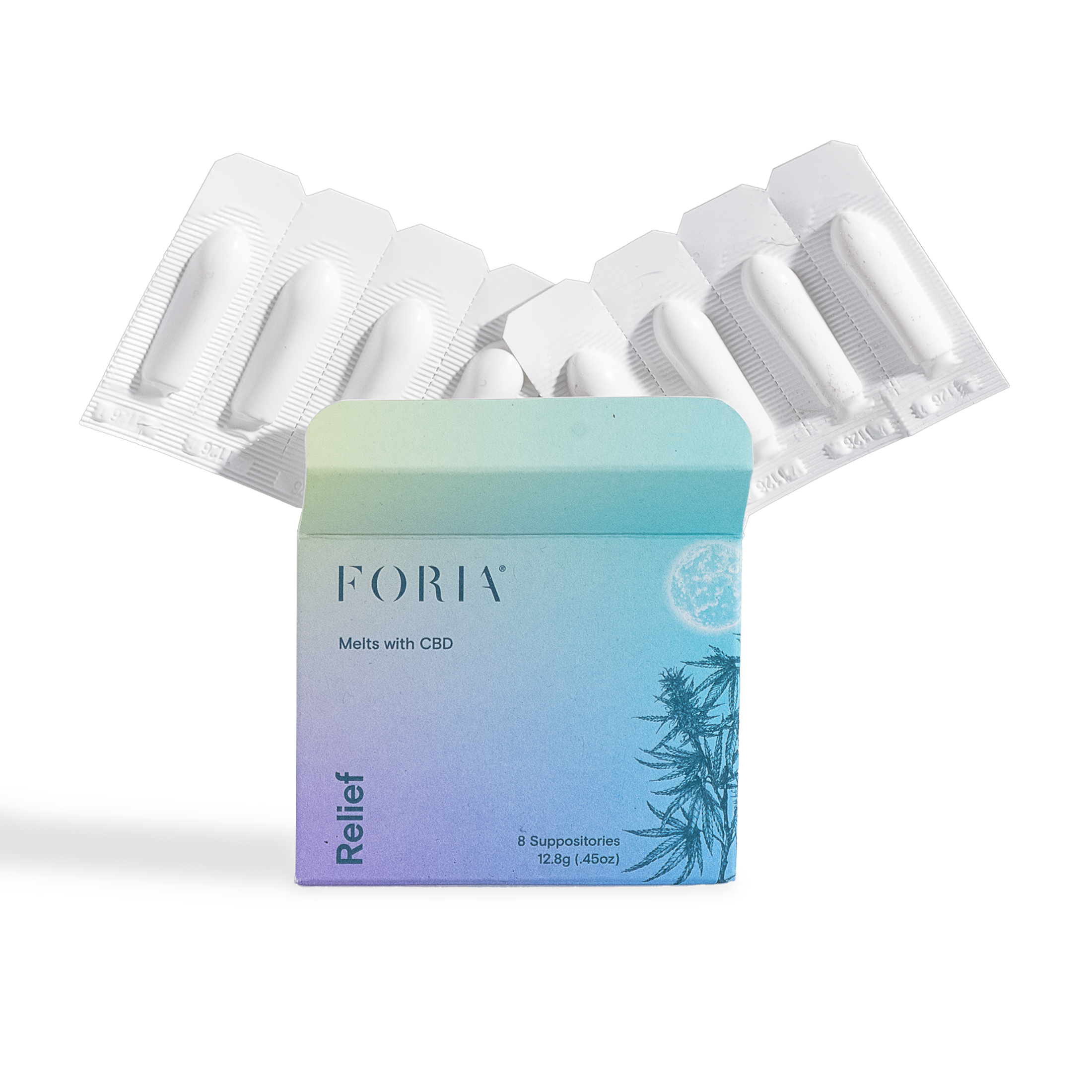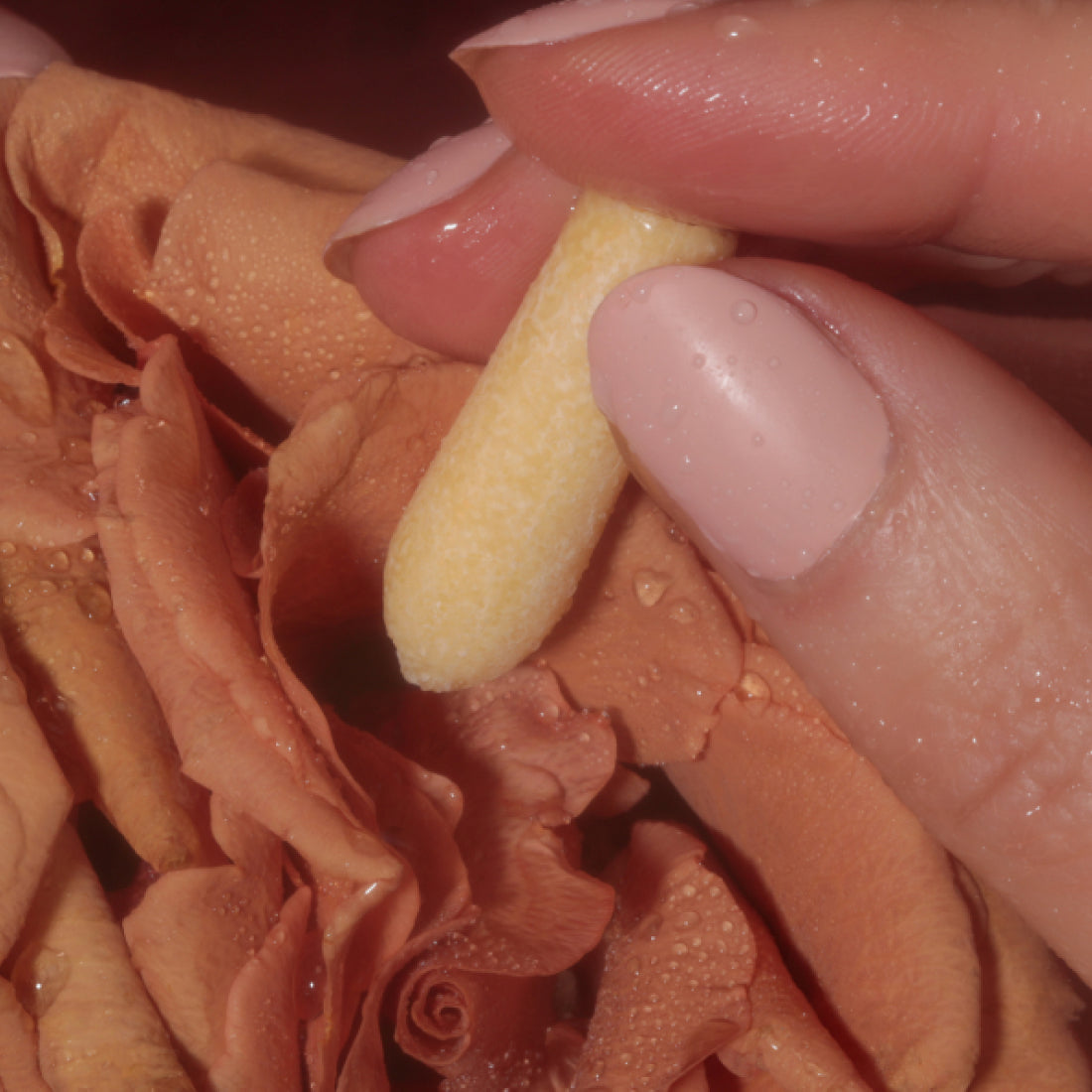Being in sync with your cycle doesn't just mean you know when your period is coming or what phase of the moon you bleed with. It is a much richer practice of noticing the phases of your cycle and the waves of energy and emotions that come with it, and recognizing and tending to yourself in the ways you need most.
These ideas have been reflected in beloved books like Anita Diamant’s “The Red Tent”, and the resurgence of Moon Lodges, a practice originally held by indigenous Americans of the Great Plains, now adopted by period-positive pagans everywhere.
At Foria, we deeply value the core philosophy that your period can be an empowering time for rest, authentic self-care, and embracing the roots of what it means to be a person who bleeds.
That’s why we developed our Relief Collection – to celebrate your cycles, with all-natural and organic ingredients that work with your body to provide gentle support for the challenges that can come with having a period, when too few good options exist (still!).
With the widespread lack of positive cultural, historical, and medical support for menstrual cycles, we clearly need a new framework. One that honors the body, fills us with the wisdom to tend to ourselves and each other, and gives us rituals for connection and restoration.
We need that for ourselves, we need it for one another, and we need it for cultural histories that have always taken a dismissive – or even oppressively cruel – view of the female body and all we are capable of.
Menstrual Mythology
Historically speaking and worldwide, periods have always been associated with power – a deep and abiding mystery, beyond the understanding of the guys in charge.
This idea is truly global, and universal. Even ancient cultures that revered menstruation as sacred and powerful still often viewed periods as dangerous, and imposed seclusion practices. And the reasons might be as simple as fear of blood itself, and fear of the unknown.
In ancient Rome, Pliny the Elder wrote that menstruating women could control the weather just by wandering around naked in nature. Many older myths express fear that if women’s cycles weren’t monitored and controlled, the universe itself might descend into chaos.
And to this day, menstrual blood is used in the most powerful folk magic worldwide – both to attract love and luck, and to destroy enemies.
In practice these stories often proved harmful for the menstruating women of the time, whose power was seen as fearsome witchcraft. Menstrual seclusion especially has been a net negative for people who are forced to participate – even though they sometimes report a silver lining or two.
Today, we have the power to flip the script – to look at the mythic power of blood and the moon and think, “I am a badass when I bleed”.
We might not be able to control the weather, but we can embrace the wisdom of the body in caring for ourselves, celebrating the traditions that live in us and belong to us.
Cycles and Histories
For centuries, all over the world, cultural taboos have required that people who bleed remove themselves from their families and communities during their periods. This practice is often tied to the idea that periods are shameful, and menstruating people are “unclean”, dangerous, or separated from the Divine during this time.
In 1997, Anita Diamant’s bestselling novel “The Red Tent” enthralled readers everywhere. Now considered a modern classic, the novel tells the story of a secret matriarchy, where women enjoy support, community, and ancient traditions of goddess worship under the “red tent” of the title, which refers to the ancient and widespread practice of menstrual seclusion.
Diamant’s novel showed that a repressive tradition could sometimes be a positive experience – a time for rest, communion, learning, and healing, and embracing natural cycles and seasons.
However, many readers don’t know that the book takes liberties with history. There’s no evidence that “red tents” existed in that time and place. And real-life “menstrual huts” have always been dangerous, even deadly places for people who are forced to use them against their will – which is still happening today, all over the world.
If we live in “progressive”, developed societies, we might not be driven out of our homes when we get our periods. We should consider ourselves extremely fortunate for that.
But menstrual taboos still exist, even in modern, secular culture. Ever been embarrassed when a tampon fell out of your purse in a restaurant? Worried that you were bleeding through your clothes? Concerned about the way you smell during your cycle?
That feeling is obviously not comparable to the terrible repression of menstruating people that continues today.
But those feelings stem from the same beliefs – that periods must be hidden away, that they are unclean, and that the female body and all that it does offends the people around us (same goes for breastfeeding and birth). It is even hidden in how we speak about periods as always being only a pain or a burden, as opposed to something that can connect us to our own magic.
A Red Tent For Today
Outside of ancient spiritual traditions, modern earth-based spiritual practices have celebrated the cycles of the female body since the resurgence of feminism and eco-consciousness in the sixties and seventies.
Candles, herbs, chants, and communing with your coven of choice can all be splendid options for embracing your inner calendar and affirming the power in your body.
But even if you don’t identify as a spiritual person – or you’re grounded in your own spiritual understanding – we urge you to make time and space for nourishing yourself when you bleed, and honoring those who come before – and will come after. And we’ll be here to support you at every step.
Some ideas:
- Organize quiet gatherings with friends and family who share your cycle, perhaps a potluck meal with supportive foods front and center. Put on your favorite movies, add some hot tea and you’ll be lounging in menstrual luxury.
- Schedule an every-month ritual bath time, as free of distractions as possible – turn your phone off and get someone else to take the kids for an afternoon.
- Keep a cycle journal to track how your thoughts and feelings change over the course of the month. Many damaging myths about PMS persist to this day, when the truth is that a drop in warm-fuzzy estrogen may just make you less likely to take anyone’s nonsense – which can only be a good thing.
- And keep in mind that your cycle encompasses much more than just the days you have your period! Your body is always on its own calendar, and needs different things at different times depending on the uniqueness of you.
It’s clear that our relationships with our menstrual cycles are starting to change. More and more people are sharing wisdom about having a more comfortable and nourishing period.
It’s also clear that there aren’t many historical times or cultures that have supported women and people who bleed in the way we actually need.
We all have an amazing opportunity, right now, to begin to create something new. Practices that honor the body, support the hormones, and celebrate the magic of what it means to have a cycle that can bring so many different experiences to our lives.
When we center our focus on what period care can truly look like, the possibilities are endless.
As we see in new, emerging menstrual traditions, we all crave community and rest, and places to honor the cycle of our bodies together.
And when one of us takes the first step, it begins a ripple effect that floods out to our families and friends and communities – where we can have real impact, now and throughout history to come.
References:
Restriction and Renewal, Pollution and Power, Constraint and Community: The Paradoxes of Religious Women’s Experiences of Menstruation
Featured in this article
Want more? Sign up for our newsletter
By entering your email, you are agreeing to our terms and conditions and understand our privacy policy.










